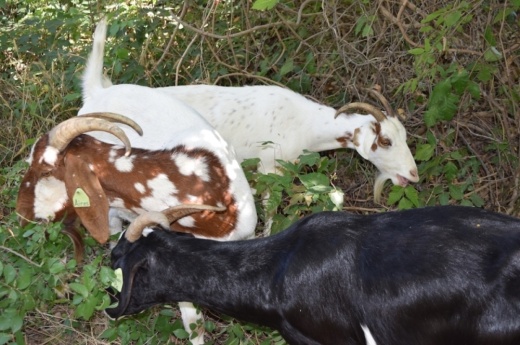In a nutshell
A herd of 150 goats spent nearly three weeks between mid-July through August grazing along the shoreline of the trail on invasive, noxious plants, such as poison ivy and grapevine. In total, the goats cleared 6 acres. Now, officials are asking the public for help to continue the program in the fall by offering up the goats for adoption.
Zooming in
Residents can opt to adopt a goat for a recurring donation of $20 per month, or as a one-time gift, said Mandi Thomas, The Trail Conservancy communications and engagement director. In addition, Thomas said with a one-time donation of $240 or greater, the adopter will receive an official certificate with their goat's name.
"You can visit your goat on the trail for selfies and late-night chats," Thomas said. "We just caution against goat snuggles as they are covered in poison ivy."
TTC Executive Director Heidi Anderson said the goats are not affected by the poison ivy, however, so there is no need to worry about them developing a rash.

Why it matters
Anderson said some of the benefits of using goats instead of potentially harmful chemicals include:
- Protecting the native plants in the areas along the trail and lake
- Removing poison ivy and other noxious plants that would be challenging for humans to remove
- Preventing the spread of chemicals that may have otherwise been used
- Decreasing the risk of wildfires developing
- Reducing the risk of visitors getting a rash from poison ivy
- Increasing sightliness for visitors
The goats were trained and are managed by Carolyn Carr, co-owner of Rent-A-Ruminant Texas. Carr said each goat was given a name to fit their personality—and each goat wears an earring with their name on it.
Thomas said the fundraising goal for the Adopt-a-Goat project is $40,000, which would cover the goats' portion of the work for both their July visit and their return visit in the fall; however, Thomas said that number does not include staff time and associated restoration efforts that will occur once the areas are cleared.
Some of the restoration work planned includes trail teams coming in and using heavy mulch to prevent the germination of invasive plants in the future. Teams will then replant the areas with native plants during the fall and winter months.
Get involved
As a local nonprofit organization, TTC depends largely on its members, volunteers and sponsors to continue its mission of maintaining and beautifying the environment along the trail. Anderson said there are several ways to help TTC accomplish its goals, including:
- Members: Memberships range from $1-$25,000-plus annually, and can be made as a one-time gift or by becoming a sustaining member.
- Volunteers: Individuals, businesses, corporations and community groups are invited to volunteer throughout the year.
- Sponsors: TTC offers several sponsorship opportunities, which can include companies, individuals, businesses and foundations.
- Tip the Trail: The trail is free for anyone to use; however, a $1 donation is appreciated and can go a long way, Anderson said.





